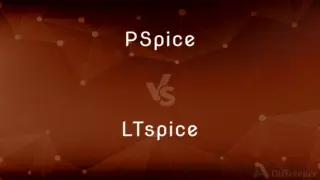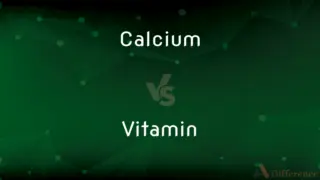RTV vs. Silicone — What's the Difference?
By Tayyaba Rehman — Published on December 10, 2023
RTV stands for "Room-Temperature Vulcanizing", a curing process, while Silicone is a polymer made from silicon, oxygen, carbon, and hydrogen.
Difference Between RTV and Silicone
Table of Contents
ADVERTISEMENT
Key Differences
RTV (Room-Temperature Vulcanizing) is a term that describes the curing process where certain compounds, often silicones, vulcanize or set at room temperature. Silicone, on the other hand, is a synthetic polymer comprising silicon, oxygen, carbon, and hydrogen. These materials possess unique properties making them versatile in various industries.
For RTV, its ability to cure without the need for added heat is a distinct advantage. Meanwhile, Silicone, owing to its stability, flexibility, and resistance to water and many chemicals, finds its use in a myriad of applications, from cookware to medical devices.
Both RTV and Silicone are closely related in that RTV silicones are a subgroup of silicones that cure at room temperature.
While all RTV products are silicones, not all silicones are RTV.
Comparison Chart
Definition
Refers to the curing process.
A synthetic polymer.
ADVERTISEMENT
Composition
Curing agents and often silicones.
Silicon, oxygen, carbon, and hydrogen.
Uses
Sealants, mold-making.
Cookware, medical devices, sealants.
Relationship
A subgroup of silicones.
A broader category, includes RTVs.
Curing
Cures at room temperature.
Can require heat or other methods to cure.
Compare with Definitions
RTV
Used for mold-making and casting.
The artist chose RTV for its precision in capturing details.
Silicone
Common in personal care products like shampoos and conditioners.
The Silicone in the shampoo gives a smooth finish to the hair.
RTV
Room-Temperature Vulcanizing agent.
Use the RTV to seal the gaps.
Silicone
A synthetic polymer made of silicon, oxygen, carbon, and hydrogen.
Silicone baking mats are popular due to their non-stick properties.
RTV
Resistant to moisture and environmental factors.
For outdoor applications, RTV is often preferred.
Silicone
Used in medical implants due to its biocompatibility.
The doctor used a Silicone implant for the surgery.
RTV
A type of silicone that cures without heat.
The RTV sealant dried quickly in the room's ambient temperature.
Silicone
Resistant to heat, cold, and UV radiation.
The Silicone spatula can withstand high frying temperatures.
RTV
Often used in automotive for gaskets.
The mechanic applied RTV to ensure a tight seal.
Silicone
Essential in electronics for insulation properties.
The Silicone coating protected the wires from short-circuiting.
Silicone
Any of a large group of oligomers and polymers based on the structural unit R2SiO, where R is an organic group, characterized by wide-range thermal stability, high lubricity, extreme water repellence, and physiological inertness and used in adhesives, lubricants, protective coatings, paints, electrical insulation, synthetic rubber, and prosthetic replacements for body parts.
Silicone
(chemistry) Any of a class of inert, semi-inorganic polymeric compounds (polysiloxanes), that have a wide range of thermal stability and extreme water repellence, used in a very wide range of industrial applications, and in prosthetic replacements for body parts.
Silicone
(transitive) To join or treat (something) with a silicone-based product.
Silicone the bathtub to the tile
Silicone
To enhance or reconstruct (a body part) with a prosthesis containing silicone.
Silicone
Any of a large class of siloxanes that are unusually stable over a wide range of temperatures; used in lubricants and adhesives and coatings and synthetic rubber and electrical insulation
Common Curiosities
Is RTV the same as Silicone sealant?
RTV is a type of Silicone sealant that cures at room temperature.
What does RTV stand for?
RTV stands for "Room-Temperature Vulcanizing".
What makes Silicone unique in its applications?
Silicone is heat, cold, and UV resistant, making it versatile.
Why is Silicone used in medical applications?
Silicone is biocompatible, meaning it's safe to use within the human body.
Is Silicone a natural or synthetic material?
Silicone is a synthetic material.
Does RTV adhere well to surfaces?
RTV typically adheres well to a variety of surfaces, making it a good sealant.
Are all RTVs made of Silicone?
While most RTVs are silicones, there can be other RTV materials as well.
How is Silicone defined?
Silicone is a synthetic polymer made from silicon, oxygen, carbon, and hydrogen.
Are there different types of Silicone?
Yes, there are various types of Silicone, including RTVs, designed for specific applications.
Why do mechanics use RTV?
RTV is used in automotive applications for its sealing properties, especially for gaskets.
Are RTV products flexible after curing?
Yes, most RTV products retain flexibility after curing.
Can RTV be cured with heat?
RTV is designed to cure at room temperature, but heat can sometimes accelerate the process.
How long does it take for RTV to cure?
Depending on the product, RTV can take hours to days to fully cure.
Is Silicone safe for food contact?
Food-grade Silicone is safe for food contact and is used in many kitchen products.
How is Silicone different from silicon?
Silicon is a chemical element, while Silicone is a polymer derived from silicon.
Share Your Discovery

Previous Comparison
Stomata of Monocot Plants vs. Stomata of Dicot Plants
Next Comparison
Type A Personality vs. Type B PersonalityAuthor Spotlight
Written by
Tayyaba RehmanTayyaba Rehman is a distinguished writer, currently serving as a primary contributor to askdifference.com. As a researcher in semantics and etymology, Tayyaba's passion for the complexity of languages and their distinctions has found a perfect home on the platform. Tayyaba delves into the intricacies of language, distinguishing between commonly confused words and phrases, thereby providing clarity for readers worldwide.














































